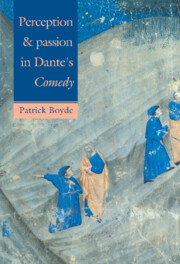Book contents
- Frontmatter
- Contents
- Preface
- PART ONE Coming to terms with Aristotle
- PART TWO The operations of the sensitive soul in man
- PART THREE The operations of the rational soul
- PART FOUR Combined operations
- 11 Fear
- 12 Anger
- 13 Desire
- Notes
- Select bibliography
- Index of Latin terms
- Index of longer quotations
- General index
12 - Anger
Published online by Cambridge University Press: 14 October 2009
- Frontmatter
- Contents
- Preface
- PART ONE Coming to terms with Aristotle
- PART TWO The operations of the sensitive soul in man
- PART THREE The operations of the rational soul
- PART FOUR Combined operations
- 11 Fear
- 12 Anger
- 13 Desire
- Notes
- Select bibliography
- Index of Latin terms
- Index of longer quotations
- General index
Summary
Ira in universali et in typo
When the protagonist was silently following Virgil along the dyke of the fifth bolgia, his reasoning and imagining sprang not only from fear, but also from a close familiarity with the scholastic analysis of the passion of anger (in Latin, ira or iracundid). The devils have been put to ‘scorn’ and they have been ‘hurt’. They will therefore feel ‘anger’, which will move them to give ‘chase’ not just swiftly, but ‘cruelly’. Even the choice of animals in a simile (‘più crudeli / che'l cane a quella lievre’) is significant, because the hare was the standard example of a propensity to fear, while the animal proverbial for its anger was the dog.
We can in fact gain a very good preliminary idea of Dante's presentation of anger in the poem by glancing at his references to dogs. They are not symbols of fidelity, watchfulness or protection. They are savage; they snarl, bark and howl; they rush out to attack beggars; they crunch their teeth on bones. In Dante's experience, dogs are ‘rabid’. It is no coincidence that the expressive vernacular word ‘rabbia’ (like the English word ‘rage’) derives from the Latin rabies. And similarly, it is no accident that when Queen Hecuba went out of her mind she ‘howled like a dog’, or that the protagonist should repel an angry assailant with the words: ‘Get back there with the other dogs.’
- Type
- Chapter
- Information
- Perception and Passion in Dante's Comedy , pp. 245 - 274Publisher: Cambridge University PressPrint publication year: 1993



